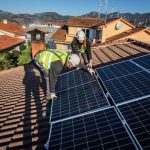Wendy’s is demonstrating that sustainability can be a powerful business strategy. This case study explores their partnership with Ampion to supply over 130 restaurants with solar energy. We’ll examine the motivations behind this move, the resulting cost savings, and the environmental benefits. We’ll also analyze the challenges faced and the lessons learned for other companies seeking cleaner energy solutions, showcasing why sustainability isn’t just a trend but a smart business decision that enhances energy efficiency. To understand solar energy production, see solar panel output.
Wendy’s Solar Partnership: Renewable Energy Initiatives
Wendy’s is demonstrating significant progress in sustainability through its solar energy program. Collaborating with Ampion, a community solar specialist, they’re powering over 130 restaurants nationwide with solar energy. This initiative demonstrably improves the environment and Wendy’s financial performance, leading to positive brand recognition.
Teaming Up for Solar Power: Wendy’s and Ampion Synergies
The key to Wendy’s success lies in its strategic alliance with Ampion. Ampion streamlines the transition to solar energy, benefiting both company-owned and franchised Wendy’s locations, simplifying the complexities of adapting renewable energy technologies. This offers a considerable advantage for a geographically dispersed organization like Wendy’s. Securing consistent, affordable clean energy presents a challenge for any major corporation, but this partnership effectively addresses it. Moreover, the cost reductions greatly benefit franchisees, making the transition financially appealing while boosting their environmental contributions. This mutually beneficial arrangement illustrates how collaboration can significantly accelerate sustainability efforts, fostering a sustainable future for QSR Franchises.
Going Beyond the Numbers: Measuring Wendy’s Success Metrics
While precise figures on the percentage of Wendy’s restaurants operating entirely on solar power may vary, their commitment is unmistakable. Their goal is a substantial reduction in their environmental impact, and their actions are significant. They also utilize Renewable Energy Certificates (RECs), which act as supplemental renewable energy credits, ensuring a dependable supply even when sunlight is limited. This multifaceted approach shows that achieving ambitious environmental objectives often requires employing a variety of strategies, enhancing brand reputation. Wendy’s aims to reduce Scope 1 and 2 emissions by 47% and Scope 3 emissions from franchisees by 47% per restaurant by 2030, from a 2019 baseline.
The Challenges and What the Future Holds for Wendy’s
Despite the notable progress, Wendy’s faces ongoing challenges in expanding their solar program. Sustaining a consistent energy supply across all locations and integrating more restaurants into the initiative remains a priority. Handling RECs effectively and maintaining close collaboration with energy providers and local regulators are vital in this context. Looking ahead, integrating energy storage solutions into their community solar projects could greatly improve the stability and dependability of their clean energy system, reducing their carbon footprint. Wendy’s is also exploring opportunities to influence policy and advocate for more widespread adoption of renewable energy within the QSR industry.
Lessons Learned: What Other Businesses Can Take Away From This Green Initiative
Wendy’s journey offers crucial lessons for businesses within the fast-food sector and beyond on how to implement cost effective sustainable energy solutions. The main points include:
- Strategic Alliances: Partnering with a renewable energy expert is crucial, fostering renewable energy adoption.
- Transparent Communication: Openly sharing progress and challenges builds trust and demonstrates commitment to sustainability.
- Franchisee Involvement: Providing incentives and support ensures franchisees are motivated to participate, improving energy efficiency.
- Regulatory Compliance: Understanding and adhering to local regulations and policies is essential for navigating challenges, ensuring compliance.
- Long-Term Vision: Sustainability initiatives require a long-term commitment and a willingness to adapt to changing circumstances.
Wendy’s success illustrates that making a business more sustainable can also be a smart business decision. In addition to reducing their carbon footprint, they are strengthening their brand image and taking the lead in the fast-food industry.
Mitigating the Risks: Navigating the Solar Landscape for QSR Franchises
Transitioning to renewable energy brings inherent risks. Here’s how Wendy’s could manage potential issues:
| Risk Factor | Likelihood | Impact | Mitigation Strategy |
|---|---|---|---|
| REC market price swings | Medium | Medium | Diversify REC sources; secure long-term contracts, improving sustainability initiatives. |
| Delays in solar project setup | Low | Medium | Partner with reliable developers; have backup plans for energy efficiency. |
| Changes in regulations | Low | High | Stay informed about changes; actively participate in policy discussions; adjust strategy as needed to navigate challenges. |
| Franchisee participation | Medium | Medium | Offer incentives; training; foster a sense of community and shared goals in QSR Franchise. |
| Challenges connecting to grid | Low | Medium | Work closely with the utility companies. |
| Weather-related variability | Medium | Medium | Diversify solar project locations; invest in energy storage solutions to maintain continuity. |
Wendy’s solar partnership serves as an excellent model for businesses seeking to achieve sustainability goals strategically. Their story demonstrates that innovation, collaboration, and informed decision-making are crucial for fostering a greener future, promoting brand recognition. It’s an ongoing journey of improving energy efficiency, not a final destination.
How to Implement Community Solar in a QSR Franchise: Lessons from Wendy’s Best Practices
Wendy’s rapid expansion of community solar presents a robust framework for other quick-service restaurants (QSRs) to learn how to implement community solar in a qsr franchise. Their achievements provide invaluable insights. Let’s delve into their strategy and environmental stewardship.
Wendy’s Solar Strategy: A Multi-Pronged Approach to Renewable Energy Technologies
Wendy’s didn’t simply adopt solar energy overnight. Their strategy involved forming key partnerships, engaging franchisees, and adopting a geographically diverse approach, showcasing their environmental stewardship. By partnering with Ampion, a community solar provider, they bundled solar subscriptions with Renewable Energy Certificates (RECs). This simplified involvement for franchisees, lowering entry barriers, mitigating challenges and enhancing the financial appeal of solar power.
By mid-2024, over 130 restaurants were partaking in community solar initiatives across various states, including Florida, Illinois, Massachusetts, and New York. This diversification lessened risk and amplified impact of adapting renewable energy technologies. With plans to reach over 200 restaurants by 2025, their dedication to renewable energy is evident, showcasing their environmental stewardship. Furthermore, nearly 70 Wendy’s Company-operated restaurants in Florida are enrolled and receiving solar energy from Duke Energy’s Clean Energy Connection program and FPL’s SolarTogether® program.
Key Success Factors: Partnerships & Engagement For Franchisees
The triumph of Wendy’s program hinges on several critical elements. Firstly, their collaboration with Ampion simplified processes for franchisees, adapting renewable energy technologies. Secondly, their proactive engagement with franchisees cultivated participation and support. How did they manage this? By offering transparent data on the financial and ecological advantages, they instilled a sense of shared responsibility. This strategy is crucial, highlighting that how to implement community solar in a qsr franchise involves more than just technology, it’s about the people involved. Wendy’s also provided training and resources to help franchisees understand the benefits and navigate the complexities of community solar.
Addressing Challenges and Future Steps for Innovation
While Wendy’s progress is notable, challenges remain. Long-term cost-saving data remains limited, requiring further analysis to quantify the financial advantages of community solar versus conventional energy sources. The volatile REC market and possible grid integration problems also pose future considerations. How can Wendy’s sustain momentum and navigate these potential hurdles? By continuously assessing new community solar options, exploring on-site solar possibilities where practical, and establishing thorough ESG reporting, they can guarantee sustained success, fostering innovation and continuous improvement. Wendy’s is also exploring the integration of battery storage solutions to enhance the reliability and resilience of their renewable energy supply.
Actionable Insights for QSRs for Sustainable Energy Solutions
Wendy’s journey provides a clear path for other QSRs contemplating community solar investments. Here’s a detailed breakdown:
Key Takeaways:
- Strategic Partnerships: Partnering with experienced community solar providers simplifies implementation and reduces risk, promoting sustainable energy solutions.
- Franchisee Engagement: Clear communication and financial incentives are essential for securing franchisee buy-in, fostering innovation.
- Geographic Diversification: Spreading participation across multiple states mitigates risks associated with individual state policies or infrastructure limitations, promoting sustainable energy solutions.
- Long-Term Cost Analysis: Thorough cost-benefit analyses are crucial for justifying investment and demonstrating long-term financial viability.
- Continuous Monitoring and Adaptation: Regularly assessing program performance and adapting to evolving market conditions is essential for long-term success, promoting sustainable energy solutions.
- ESG Reporting: Transparently reporting on environmental, social, and governance (ESG) metrics enhances accountability and attracts environmentally conscious investors and customers.
Ampion’s Role: Essential for Wendy’s Renewable Energy Success and QSR Sustainability for Franchisees
Wendy’s sustainability commitment is evident, with ambitious targets of a 47% emissions cut by 2030. But how is this being achieved? Ampion plays a critical role in Wendy’s renewable energy strategy, fostering
- How To Make Free Electricity To Run Your Home With Renewable Sources - February 12, 2026
- How to Produce Free Energy for Your Home - February 11, 2026
- How to Generate Electricity for Free at Home - February 10, 2026
















